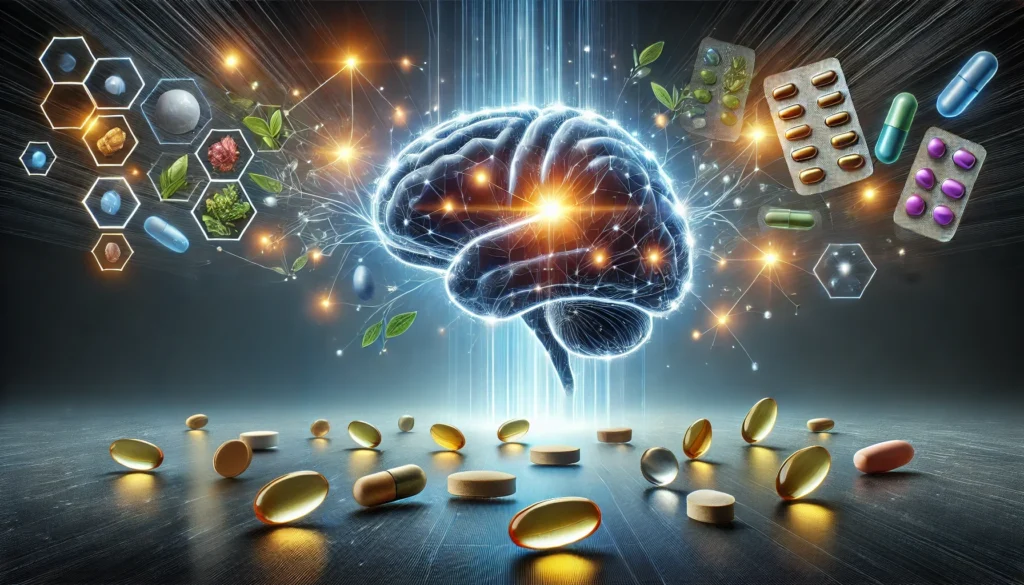Before delving into natural supplements, it’s crucial to understand depression itself. Characterized by persistent sadness, lack of interest or pleasure in activities, and a variety of physical and emotional issues, depression can be debilitating. The traditional approach to treatment often involves a combination of medication, such as antidepressants, and psychotherapy. However, the side effects associated with pharmaceuticals and the desire for holistic approaches have driven interest in natural alternatives.
The Nature of Depression
Depression is not just a fleeting sadness but a chronic state of mental distress that can interfere with daily functioning. It often manifests through symptoms such as fatigue, changes in appetite, sleep disturbances, and difficulty concentrating. Understanding these symptoms is essential for recognizing the condition and seeking appropriate treatment.
Conventional Treatment Methods
Antidepressants and psychotherapy are the cornerstones of conventional depression treatment. Antidepressants work by altering brain chemistry to improve mood, while psychotherapy provides a supportive environment to explore emotional challenges. However, not everyone responds well to these treatments, which can lead to the exploration of alternative options.
The Shift Towards Holistic Approaches
The interest in holistic approaches is driven by a desire for treatments that align with natural and integrative health philosophies. Many individuals are drawn to treatments that consider the whole person, including physical, emotional, and spiritual well-being, rather than focusing solely on symptoms.
You May Also Like: Top Brain Health Product Brands Reviewed
The Rise of Natural Supplements for Depression
In recent years, the use of natural supplements has gained popularity as individuals seek to improve their mental health. This trend is part of a broader movement towards holistic health and wellness, where individuals take proactive steps to improve their well-being. Many people prefer supplements because they are perceived as being more “natural” and less likely to cause adverse effects compared to traditional medications.
Growing Popularity and Market Trends
The supplement industry has experienced significant growth, driven by increasing consumer interest in natural health products. As more people seek alternatives to pharmaceuticals, the demand for supplements that support mental health has surged, reflecting a broader trend towards preventive health care.
Public Perception and Misconceptions
Many people perceive natural supplements as safer and more benign than pharmaceuticals. However, this perception can lead to misconceptions about their efficacy and safety. It’s important to approach supplements with the same level of scrutiny as any other treatment and to be informed about their potential benefits and risks.
The Role of Lifestyle and Wellness Movements
The rise of wellness movements has fueled interest in natural supplements. These movements emphasize the importance of a balanced lifestyle, which includes nutrition, exercise, and mental well-being. Supplements are often seen as a component of a comprehensive wellness strategy that supports overall health.
Historical Context of Herbal Remedies
Throughout history, various cultures have utilized plants and herbs to address mental health issues. Traditional Chinese Medicine (TCM) and Ayurveda, for instance, have long incorporated herbal remedies to enhance mood and support mental well-being. These practices laid the groundwork for the modern interest in natural supplements for mental health.
Ancient Practices and Beliefs
Herbal remedies have been used for centuries, with each culture having its unique approach to healing. Ancient civilizations believed in the power of nature to restore balance and harmony within the body, using herbs to treat a wide range of ailments, including mental health issues.
The Influence of Traditional Chinese Medicine
Traditional Chinese Medicine (TCM) has played a significant role in the use of herbs for mental health. In TCM, herbs are used to balance the body’s energy, or qi, and to address underlying imbalances that may contribute to mood disorders. This holistic perspective has influenced modern approaches to herbal supplementation.
Ayurvedic Contributions to Mental Health
Ayurveda, the ancient Indian system of medicine, also emphasizes the use of herbs to promote mental well-being. Ayurvedic practitioners use herbs to balance the body’s doshas, or energies, with the aim of achieving harmony in mind and body. These ancient practices continue to inform contemporary interest in herbal supplements.

Common Natural Supplements for Depression
As we venture into the realm of natural supplements, it’s important to consider which ones are most commonly used and how they might assist in alleviating depressive symptoms. Here are some of the most researched and widely used supplements:
Omega-3 Fatty Acids
Omega-3 fatty acids, particularly those found in fish oil, have been extensively studied for their potential benefits in mental health. They are believed to help reduce inflammation and improve brain function, which may alleviate symptoms of depression.
Mechanisms of Action
Omega-3s are thought to work by reducing inflammation in the brain, which is linked to depression. They also support the structural integrity of brain cells and enhance neurotransmitter function, potentially leading to improved mood and cognitive performance.
Sources and Types
Omega-3s are commonly found in fatty fish, such as salmon and mackerel, as well as in flaxseeds and walnuts. Supplements often contain EPA (eicosapentaenoic acid) and DHA (docosahexaenoic acid), the two main types of omega-3 fatty acids associated with mental health benefits.
Research Evidence
Numerous studies have investigated the relationship between omega-3 intake and depression. While some research supports their efficacy in reducing depressive symptoms, other studies have yielded mixed results, highlighting the need for further investigation.
St. John’s Wort
St. John’s Wort is a well-known herbal remedy that has been used for centuries to combat depression. It is thought to work by increasing the levels of neurotransmitters such as serotonin in the brain, similar to the mechanism of some antidepressant medications.
Historical Usage
St. John’s Wort has a long history of use in European traditional medicine for treating mood disorders. Its use dates back to ancient Greece, where it was prescribed for “melancholy” and other mental ailments.
Active Compounds
The active compounds in St. John’s Wort, such as hypericin and hyperforin, are believed to contribute to its antidepressant effects. These compounds are thought to influence neurotransmitter activity, leading to improved mood and emotional stability.
Clinical Studies and Effectiveness
Clinical studies on St. John’s Wort have shown mixed results. While some research indicates that it can be effective for mild to moderate depression, its efficacy for severe depression remains unclear. Additionally, it can interact with other medications, necessitating caution and consultation with a healthcare provider.
S-Adenosylmethionine (SAMe)
SAMe is a naturally occurring compound in the body that has been studied for its antidepressant properties. It is believed to enhance the levels of neurotransmitters involved in mood regulation, and some studies suggest it may be effective in treating depression.
Biological Role in the Body
SAMe plays a crucial role in numerous biological processes, including the synthesis of neurotransmitters. It is involved in methylation, a process that affects gene expression and neurotransmitter production, which can influence mood and emotional health.
Supplementation and Dosage
SAMe supplements are available in various forms, and dosage recommendations can vary. It’s important for individuals to consult with a healthcare professional to determine the appropriate dosage and to monitor for any potential side effects.
Research Findings
Research on SAMe’s effectiveness in treating depression has shown promising results, with some studies indicating improvements in mood and emotional stability. However, further research is needed to establish standardized treatment protocols and to better understand its long-term effects.
5-HTP (5-Hydroxytryptophan)
5-HTP is a precursor to serotonin, a neurotransmitter that plays a crucial role in mood regulation. By increasing serotonin levels, 5-HTP may help improve symptoms of depression and anxiety.
How 5-HTP Works
5-HTP is converted into serotonin in the brain, which can help regulate mood, sleep, and appetite. By boosting serotonin levels, 5-HTP may contribute to a sense of well-being and reduce symptoms of depression.
Natural Sources and Supplement Form
While 5-HTP is not found in food, it is derived from the seeds of the African plant Griffonia simplicifolia. Supplements are widely available and are commonly used as an alternative to traditional antidepressants.
Studies and Efficacy
Studies on 5-HTP’s effectiveness have produced mixed results. While some research supports its use for improving mood and reducing depressive symptoms, other studies call for more robust evidence to confirm its efficacy and safety.
Vitamin D
Vitamin D deficiency has been linked to depression, and supplementation may improve mood in individuals with low levels. Exposure to sunlight is a natural way to boost vitamin D levels, but supplements can be beneficial, especially in regions with limited sun exposure.
The Connection Between Vitamin D and Mood
Vitamin D receptors are present in many areas of the brain, and the vitamin is involved in the production of neurotransmitters that regulate mood. Low levels of vitamin D have been associated with an increased risk of depression.
Sources of Vitamin D
Sunlight is the primary natural source of vitamin D, but it can also be obtained from dietary sources such as fatty fish, fortified foods, and supplements. In regions with limited sunlight, supplementation may be necessary to maintain adequate levels.
Research and Recommendations
Research suggests that vitamin D supplementation may help improve mood in individuals with deficiency. However, the optimal dosage and long-term effects are still being studied, and recommendations should be tailored to individual needs.
B Vitamins
B vitamins, particularly B6, B9 (folate), and B12, are essential for brain health and the production of neurotransmitters. A deficiency in these vitamins can lead to mood disturbances, and supplementation may help alleviate depressive symptoms.
The Role of B Vitamins in Mental Health
B vitamins are crucial for energy production and the synthesis of neurotransmitters, which are essential for maintaining mood stability. Deficiencies in these vitamins can disrupt these processes and contribute to depression.
Dietary Sources and Supplementation
B vitamins are found in a variety of foods, including whole grains, meat, eggs, and leafy greens. Supplements can help individuals with dietary restrictions or absorption issues maintain adequate levels of these important nutrients.
Clinical Evidence and Benefits
Clinical studies have shown that B vitamin supplementation can improve mood and reduce symptoms of depression, particularly in individuals with deficiencies. However, further research is needed to establish standardized guidelines for their use in mental health treatment.
Magnesium
Magnesium is involved in numerous biochemical reactions in the body, including those that regulate mood. Some research suggests that magnesium supplementation can help improve symptoms of depression.
Magnesium’s Role in the Body
Magnesium plays a critical role in nerve function, muscle contraction, and the regulation of neurotransmitters. It helps maintain healthy brain function and supports mood stabilization.
Sources and Supplement Forms
Magnesium is found in foods such as nuts, seeds, whole grains, and leafy green vegetables. Supplements are available in various forms, including magnesium citrate, oxide, and glycinate, each with different absorption rates.
Research and Potential Benefits
Research indicates that magnesium supplementation may be beneficial for individuals with depression, particularly those with low magnesium levels. However, more studies are needed to determine the optimal dosage and long-term efficacy.

The Science Behind Natural Supplements
While the use of natural supplements is widespread, it’s important to approach them with a critical eye. Scientific research on these supplements is ongoing, and while some studies show promising results, others are inconclusive. It’s crucial to consult with healthcare professionals before starting any supplement regimen, particularly for individuals already taking medication for depression.
Evaluating the Evidence
When considering supplements, it’s important to evaluate the quality and scope of the research. Peer-reviewed studies, clinical trials, and meta-analyses provide valuable insights into the efficacy and safety of supplements, but it’s essential to recognize the limitations of current research.
Potential Risks and Interactions
Natural supplements can interact with prescription medications, leading to adverse effects. Understanding these interactions and potential side effects is crucial for ensuring safe and effective use. Healthcare professionals can provide guidance on managing these risks.
Importance of Personalized Approaches
Each individual’s response to supplements can vary based on genetics, lifestyle, and existing health conditions. Personalized approaches to supplement use, guided by healthcare professionals, can help optimize outcomes and ensure safety.
Current Trends and Future Implications
The growing interest in natural supplements is part of a broader trend towards personalized medicine, where treatments are tailored to individual needs and preferences. As research advances, we may see more evidence-based guidelines for using supplements to manage depression. The integration of technology, such as genetic testing, could further refine our understanding of which supplements are most effective for specific individuals.
Personalized Medicine and Mental Health
Personalized medicine involves tailoring treatments to individual characteristics, such as genetics and lifestyle. This approach has the potential to improve treatment outcomes by aligning interventions with each person’s unique needs and preferences.
The Role of Technology in Supplementation
Advances in technology, such as genetic testing and wearable health devices, are transforming the way we approach supplementation. These technologies can provide insights into an individual’s specific needs, helping to guide personalized supplement regimens.
Future Directions in Research
Future research will likely focus on understanding the mechanisms of action of supplements, their long-term effects, and their role in combination with other treatments. This research will help establish evidence-based guidelines and enhance our understanding of their potential benefits.
Practical Advice for Supplement Use
For those considering natural supplements for depression, here are some practical guidelines:
1. Consult with a Healthcare Professional: Before starting any supplement, it’s essential to discuss it with a healthcare provider to ensure safety and compatibility with existing treatments.
- Healthcare professionals can provide guidance on appropriate dosages, potential interactions, and monitoring of side effects. Their expertise is crucial for ensuring safe and effective supplement use.
2. Choose High-Quality Products: Not all supplements are created equal. Look for reputable brands that adhere to high manufacturing standards.
- Quality supplements are produced by companies that adhere to rigorous testing and manufacturing standards. Choosing products with third-party certifications can help ensure their purity and potency.
3. Monitor for Side Effects: While natural, supplements can still cause side effects or interact with other medications. Pay attention to any changes and report them to your healthcare provider.
- Keeping track of any side effects or changes in symptoms is important for assessing the impact of supplements. This information can help healthcare providers make informed decisions about adjusting treatment plans.
4. Adopt a Holistic Approach: Supplements should be part of a broader strategy for mental health, including a balanced diet, regular exercise, and stress management techniques.
- A holistic approach to mental health involves integrating supplements with lifestyle changes, such as improved nutrition, physical activity, and mindfulness practices. This comprehensive strategy can enhance overall well-being and support mental health recovery.

Conclusion
Natural supplements offer a promising avenue for those seeking relief from depression. While they are not a replacement for traditional treatments, they can complement existing therapies and provide additional support. As research continues to evolve, we gain a deeper understanding of how these supplements work and their potential role in mental health care. By approaching supplement use thoughtfully and informedly, individuals can make empowered choices for their mental well-being.
Empowering Individuals Through Knowledge
Knowledge is a powerful tool in making informed decisions about mental health care. Educating oneself about the benefits and risks of supplements can empower individuals to take an active role in their treatment and work collaboratively with healthcare providers.
The Ongoing Journey of Mental Health
The journey to mental well-being is ongoing and multifaceted. By embracing a holistic approach that includes both traditional and alternative treatments, individuals can find a path that best suits their needs and promotes lasting mental health.
The Role of Research and Innovation
As research and innovation continue to advance, the landscape of mental health care will evolve. Staying informed about new developments can help individuals and healthcare providers make the most of emerging therapies and improve mental health outcomes.
Further Reading:
Natural remedies for depression: Are they effective?
Can a dietary supplement help ease your depression?
Important Note: The information contained in this article is for general informational purposes only, and should not be construed as health or medical advice, nor is it intended to diagnose, prevent, treat, or cure any disease or health condition. Before embarking on any diet, fitness regimen, or program of nutritional supplementation, it is advisable to consult your healthcare professional in order to determine its safety and probable efficacy in terms of your individual state of health.
Regarding Nutritional Supplements Or Other Non-Prescription Health Products: If any nutritional supplements or other non-prescription health products are mentioned in the foregoing article, any claims or statements made about them have not been evaluated by the U.S. Food and Drug Administration, and such nutritional supplements or other health products are not intended to diagnose, treat, cure, or prevent any disease.


